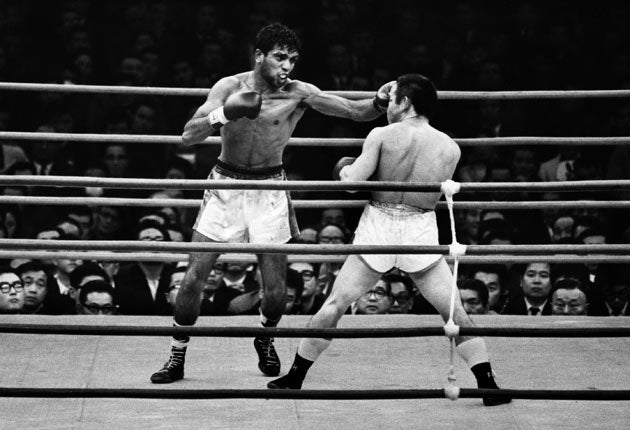Lionel Rose: Boxer whose world title victory helped bring white and black Australia together

With his lightning speed, indomitable fighting spirit and punishing left hook, Lionel Rose was arguably the best boxer Australia has produced. He was also the first Aboriginal person to win a world boxing title – and he not only inspired other indigenous sportsmen and women, but helped bridge the gap between black and white Australia.
Months before Rose's epic victory over Japan's Masahiko "Fighting" Harada in February 1968, which saw him crowned the bantamweight world champion, Australians had overwhelmingly approved a referendum for Aboriginal people to be included in the census – rather than, unbelievable as it might seem, be regarded as part of the flora and fauna. The landmark vote seemed to usher in a new era of optimism and confidence on the part of Australia's original inhabitants. Rose's win, at the age of 19, over a formidable opponent, captured that spirit. He returned from Tokyo a national hero; soon afterwards, he became the first Aborigine to be crowned Australian of the Year, and was also made an MBE.
In those days it was rare for an Aborigine to inspire such public affection; Rose was not admired not only for his exceptional talent, but for his personable and principled character. He was one of the first international sportsmen to take a stand against apartheid-era South Africa, refusing a lucrative offer to fight there in 1970.
Rose successfully defended his title three times, and also had a brief,successful career as a country music singer. But his later life was punctuated with setbacks, including a struggle with alcoholism, a gambling problem and a stint in jail for petty crime.Rehabilitated in recent years, he suffered a stroke in 2007 that left him partially paralysed.
Born in 1948, Rose was brought up in an Aboriginal shanty town, Jackson's Track, near the Victorian town of Warragul, in a hut with a dirt floor and no electricity or running water.His father, Roy, an amateur boxer,introduced him to the sport when he was 14, and he won his first major fight, at the Festival Hall in Melbourne in 1963. But it was not until he challenged Harada that Australians sat up and took notice. Although the odds were against him, his compatriots huddled around their radios, transfixed by the crackling commentary. An estimated 250,000 people turned out to greet Rose when he returned to Melbourne. "There must be someone famous in town," he reportedly observed to his trainer, Jack Rennie.
Among his biggest fans was Elvis Presley, who insisted on meeting him when he defended his title in California later that year. But Rose never forgot his roots, and he inspired many fellow Aborigines, including Evonne Goolagong Cawley, who reached the pinnacle of women's tennis. "He showed just far how an Aboriginal could go," the former world champion boxer Barry Michael said.
Rose did not campaign openly for Aboriginal rights – "We're all Australians," he once said – but he lost no opportunity to badger politicians in private. His sporting success was not reflected in his private life: his wife, Jenny, the daughter of his first trainer, Frank Oakes, divorced him, and he spent his winnings on "wine, women and song", he admitted.
After retiring in 1971, Rose made a comeback in 1975, finishing his career the following year with 42 wins, 12 by knock-out, in 53 fights. In the meantime he had embarked on his singing career, producing two Top Ten hits. His main legacy, though, is that of a man whose "inspiration went well beyond the ring", as the Melbourne newspaper The Age put it.
Kathy Marks
Lionel Rose, boxer and country music singer: born Jackson's Track, Victoria, Australia 21 June 1948; married 1970 Jennie Oakes (one son); died Warragul, Victoria 8 May 2011.
Join our commenting forum
Join thought-provoking conversations, follow other Independent readers and see their replies
Comments
Bookmark popover
Removed from bookmarks